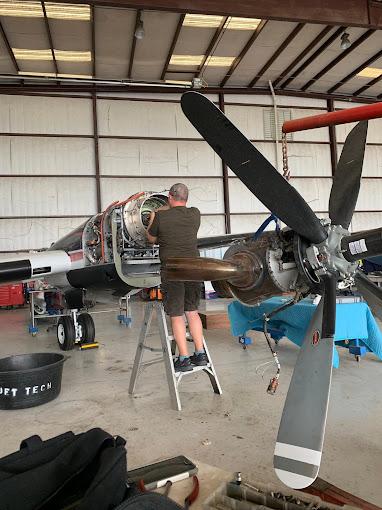The Importance of Regular Jet Engine Inspections: Keeping Aircrafts in Top Shape

In the world of aviation, safety and reliability are paramount. Every component of an aircraft plays a crucial role in ensuring a smooth and secure flight. Among these, jet engines stand as the heart of any aircraft, powering it through the skies. As a vital component, jet engines require meticulous care and attention to ensure their optimal performance. This is where regular jet engine inspections come into play. In this blog post, we will delve into the significance of conducting regular jet engine inspections and how they contribute to keeping aircraft in top shape.
1. Ensuring Safety
Safety is the cornerstone of aviation. Aircraft engineers and maintenance personnel are well aware that the safety of passengers and crew members is non-negotiable. Regular jet engine inspections play a pivotal role in upholding this safety standard. Jet engines are subjected to extreme conditions during flight, including high temperatures, pressure differentials, and vibrations. Over time, wear and tear can compromise the engine’s structural integrity, potentially leading to catastrophic failures.
By conducting routine inspections, aviation professionals can identify potential issues before they escalate. Hairline cracks, fatigue, and corrosion can be detected early, allowing for timely repairs and replacements. Such proactive measures significantly reduce the likelihood of engine-related incidents, thereby ensuring the safety of everyone on board.
2. Enhancing Reliability
Aircraft reliability goes hand in hand with safety. An aircraft that is prone to frequent breakdowns or malfunctions can disrupt flight schedules, inconvenience passengers, and damage an airline’s reputation. Jet engine failures can result in costly delays, cancellations, and unplanned maintenance, all of which have a cascading effect on an airline’s operations.
Regular inspections serve as a preventive measure to maintain the reliability of jet engines. By identifying and addressing potential issues in their early stages, maintenance teams can prevent major breakdowns and ensure that engines perform optimally throughout their lifecycle. This not only saves airlines from operational disruptions but also boosts their reputation for consistent and reliable services.
3. Improving Fuel Efficiency
Fuel efficiency is a major concern for the aviation industry. With rising fuel costs and increasing environmental awareness, airlines are constantly seeking ways to reduce their carbon footprint and operational expenses. Jet engines that are not in top shape consume more fuel, leading to higher operating costs and increased greenhouse gas emissions.
Regular inspections contribute to maintaining the efficiency of jet engines. During inspections, mechanics can identify components that might be affecting the engine’s efficiency, such as worn-out blades or clogged fuel injectors. By addressing these issues promptly, airlines can ensure that their aircraft operate at peak fuel efficiency, saving costs and reducing their environmental impact.
4. Prolonging Engine Lifespan
Jet engines are a significant investment for airlines, and their replacement costs can be substantial. However, with proper maintenance and regular inspections, the lifespan of jet engines can be significantly extended. Regular inspections help detect and rectify issues that, if left unaddressed, could lead to premature engine wear and deterioration.
Routine inspections allow mechanics to monitor the condition of engine components, identify signs of degradation, and implement necessary repairs or replacements. By adhering to a strict inspection schedule, airlines can make the most out of their engine investments, ultimately reducing the need for frequent engine replacements.
5. Regulatory Compliance
The aviation industry is subject to rigorous regulatory standards to ensure the safety of air travel. Regulatory bodies, such as the Federal Aviation Administration (FAA) in the United States and the European Union Aviation Safety Agency (EASA) in Europe, set guidelines for aircraft maintenance and inspections. Failure to comply with these regulations can result in severe penalties and the grounding of aircraft.
Regular jet engine inspections are a fundamental part of maintaining regulatory compliance. Airlines must adhere to prescribed maintenance schedules and inspection procedures to ensure that their aircraft meet the required safety standards. By conducting inspections as mandated, airlines demonstrate their commitment to passenger safety and adhere to the industry’s highest standards.
Trust Jetset Airmotive for your Regular Jet Engine Inspections
In the ever-evolving world of aviation, the importance of regular jet engine inspections cannot be overstated. These inspections are a cornerstone of aircraft safety, reliability, and efficiency. By identifying potential issues early on, airlines can prevent accidents, reduce operational disruptions, save costs, and contribute to a greener environment. The investment in regular inspections not only safeguards passengers and crew but also ensures that aircraft continue to soar through the skies with the utmost confidence. As aviation technology advances, one thing remains clear: regular jet engine inspections are an indispensable practice for keeping aircraft in top shape and ensuring the continued success of the industry.
Archives
- July 2024
- June 2024
- May 2024
- April 2024
- February 2024
- January 2024
- November 2023
- October 2023
- September 2023
- August 2023
- July 2023
- May 2023
- April 2023
- March 2023
- February 2023
- April 2022
- March 2022
- February 2022
- April 2020
- March 2020
- February 2020
- January 2020
- November 2019
- October 2019
- September 2019
- July 2019
- June 2019
- March 2019
- January 2019
- December 2018
- November 2018
- October 2018
- September 2018
- July 2018
- June 2018
- May 2018
- November 2014
- October 2014
- August 2014
- July 2014
- June 2014
- May 2014
- April 2014
- March 2014
- February 2014
- January 2014
- December 2013
- November 2013
- October 2013
- January 2013
- June 2010
- May 2010


